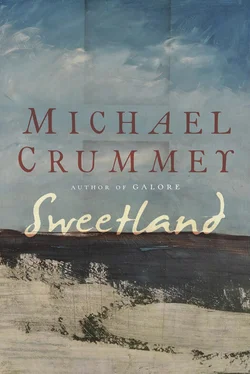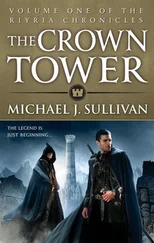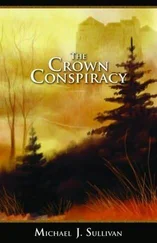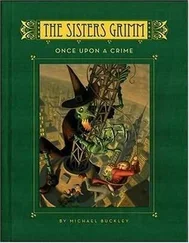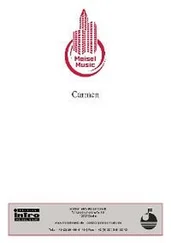Practically everyone else in the cove was gathered at the Fisherman’s Hall for the meeting with the government man and there was an eerie stillness about the place, as if the island was already abandoned. He expected Reet Verge would be sent across to badger him when the meeting was done and he packed a few things into his knapsack, drove his quad up out of the cove to avoid her. He climbed past the trail to the new cemetery and beyond it to the peak of the hills.
At the top of the climb he stopped beside the King’s Seat to take in the view of Chance Cove and the island north and south, even though Jesse wasn’t with him. Jesse had asked a thousand times if those stones had been assembled into the vague shape of a throne or if it was an accidental configuration, but no one alive knew the answer. Probably no one else had ever thought to wonder about it.
Sweetland went as far as the lighthouse, to put out a few rabbit snares that he and Jesse could check on in the morning. A surprise to welcome the youngster back, to scour the week’s worth of city grit from his mouth.
It was almost four o’clock by the time he made it back to Chance Cove. The government man away on the ferry and the town’s emissary come and gone from Sweetland’s house for now. He backed the quad into the shed and covered the machine with a tarp, went into the house through the back porch. Ran cold water from the tap while he reached for a glass.
Sweetland drew his hand back when he caught sight of the folded sheet of paper propped inside the cupboard. Stood still while the water ran, trying to think when he’d last opened that door. He used the same glass out of the drain rack for days on end, which meant it could have been planted there any time during the past week. He turned off the tap and took the sheet down, held it at arm’s length. YOU GET OUT, the message read, OR YOULL BE SOME SORRY.
He refolded the paper and opened the drawer below the forks and knives, set it in beside the other notes he’d found tucked around the house over the last six months. They were all the same, comically sinister, offering vague threats against his person and his property, all written with words and letters cut from print headlines and glued to the paper like a ransom demand out of the movies. It was a ploy so amateurish that Sweetland would have thought Loveless was behind it, but for the fact the spelling was more or less correct. And Loveless was the only hold-out left besides himself.
Sweetland shut the drawer and took down a glass, drank the water in slow mouthfuls. He couldn’t bring himself to take the threats seriously and he’d never mentioned the notes to anyone. He wasn’t sure why he was holding onto them. In case , was how he thought of it. Though he couldn’t say in case of what exactly.
He was up early the next morning with the radio on. Made himself a sandwich and an extra for Jesse, packed them with two tins of peaches. He put on his boots in the porch, carried his coat and knapsack outside. Paused there a moment, listening, then slammed the door as hard as he could. Pilgrim’s dog started barking mad where she was leashed in the yard, the sound of it echoing up off the hill behind the cove.
“Shut up, Diesel!” Sweetland shouted, louder than he needed to. “Shut the hell up!”
He puttered around the ATV underneath the purple glow of the street light attached to the shed, strapping his.22 to the handlebars, tying the canvas pack onto the carryall at the back. Heard Pilgrim’s door open and close and the sound of the boy running. Glanced up to see him motor along the side of the house. He was within two feet of Sweetland before he came to an abrupt stop and he stood there at attention, staring up into the old man’s face.
Lank and pale, the boy was, like something soaked too long in water. The purple light making his face look sallow, cadaverous. “Jesse,” Sweetland said. He had never made peace with the youngster’s name. It sounded fey, feminine, like something off one of those soap operas Sweetland’s mother used to watch. He’d tried to rechristen the boy with half a dozen nicknames — Bucko, Mister Man, Hunter — but Jesse would only answer to his proper name.
“You going up on the mash?” the boy asked.
“Got a few slips out,” Sweetland said. “Thought I might see if I had any luck. Clara know you’re up here?”
“Mom’s still asleep. I told Pop.”
“And what did your pop say?”
“He told me not to be a nuisance.”
Sweetland nodded. “Get your helmet out of the shed,” he said.
Sweetland drove out the back of his property and when they reached the King’s Seat at the top of the path Jesse slapped at his shoulder, shouting for him to stop. He jumped off the quad and ran across to the stones, pulling the helmet from his head. The sun just coming up full, the ocean deepening blue in the new light. Jesse skipped up onto the seat and stood with his arms spread wide. “I’m the King of the World!” he shouted, his voice rolling down the hill toward the cove, picking up speed as it went. “I’m the King of the World!”
Sweetland allowed he was the only person in Christendom who hadn’t seen that goddamn Titanic movie. Jesse knew the film so intimately he could quote every word of dialogue and sometimes did. He insisted on stopping whenever they passed the Seat and Sweetland waited on the quad while the boy had his moment.
“Come on, Your Highness,” he said finally, “the day idn’t getting any younger.”
Beyond the King’s Seat, the trail went east to Vatcher’s Meadow where Glad Vatcher summered his animals — half a dozen cows and the bull, twenty head of sheep fenced on forty acres of marsh grass and gorse. There was a gate on both sides so people could cross the meadow when the animals were moved into the barn for the winter, but the summer path circled the field. They drove inland about half a mile, following the barbed wire fence, until they picked up the trail on the opposite side, ravelling east over the headlands to Burnt Head. The plateau was dotted with massive granite boulders that Jesse claimed were called erratics, dropped there by retreating glaciers at the end of the last ice age.
Is that what they’re teaching you in school these days, he’d asked.
Saw it on television, Jesse said.
It was a wonder to Sweetland what stuck in the youngster’s head. He still insisted on taking off every stitch of clothes just to take a piss and couldn’t be counted on to flush the toilet, but he could lecture a body on a hundred different topics — aircraft, the digestive system, moon landings, Mount Everest, ping-pong, whales. Sweetland dreaded getting the boy started on whales. Their Latin names, their numbers and size, their diets, their migration routes, the sound and meaning of their songs. It was as if there was a tape in the youngster’s head just waiting for someone to press Play.
Beyond the mash, the trail veered out toward the ocean. Ancient rock cairns placed every twenty feet along the path, to keep walkers from going over the cliff edge in the dark or in stormy weather. Three hundred feet to the surf below. The top of the old light tower was just visible beyond the rise, out on Burnt Head.
Sweetland pulled in behind the abandoned lightkeeper’s house which had been sitting unoccupied the ten years since the light was automated. Jesse ran up the rotting steps, holding his hands to the windows and reporting the latest damage. Storm winds had stripped the ocean-side shingles and the relentless wet had rotted through the ceilings, the floors a mess of ceiling plaster and soaked insulation. Mouse shit on every surface. Sweetland hated even to look at the place. “Don’t you go inside there,” he called.
He took his.22 and backpack off the quad and they headed inland again, the new light flashing on their right shoulder as they walked clear of the ruined building. Just a beacon on a metal tripod drilled into the farthest point of rock these days. A hundred feet north of the beacon there was a helicopter pad built overtop of the Fever Rocks, used by the Coast Guard when they brought supplies to the keeper, or came out for light maintenance. A helipad, Jesse told him it was called.
Читать дальше
